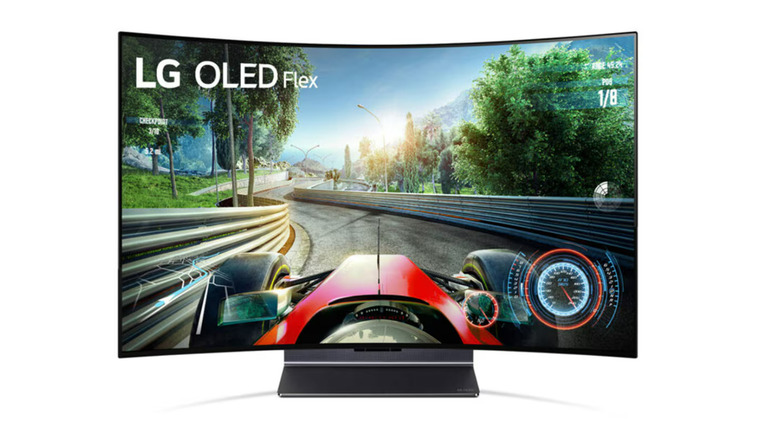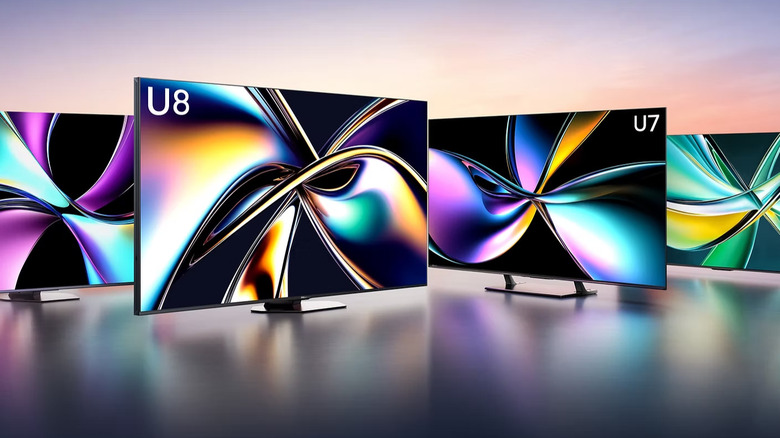Black Friday 2025: What To Look For When Shopping TV Deals
If you feel like it's coming up on time to upgrade your TV, then you're in luck: Black Friday is bound to bring big savings when it comes to all things electronics. However, it's easy to become overwhelmed or confused while TV shopping, thanks to the combination of how many different devices there are to choose from and all of the different technical specifications each TV has. Plus, technology advances quickly, so if it's been more than a few years since you last looked for a TV, then the market could've changed completely.
Exactly what you want to look out for will vary a little depending on what you're planning to use your TV for and where you're planning on putting it. For example, it probably wouldn't be useful to just look for the largest screen you can get in your budget if you're intending on building a compact setup for your trailer, RV, or to tuck away in your kitchen. So, you should probably start off with brainstorming roughly what you want from your TV before you start shopping.
Despite that, there are a few things that are worth looking out for regardless of how you're going to use your new TV. For instance, no matter how you use it, you're almost always going to benefit from a higher image resolution and frame rate, which provides a better image quality, and having a longer warranty can give you some peace of mind. A few other things you might want to look for while shopping for the best TV deals are the device's refresh rate, how many inputs it offers, what apps are available on its store, and whether it's an LED or OLED screen.
Check each TV's tech specs and compatibilities
Savings are only good if you get something that's useful for you. When it comes to confidently shopping for a new TV, there are a few key things to keep in mind to make sure that happens. Firstly, if you regularly use streaming services like Netflix or surf YouTube via your TV, then you're going to want to make sure your new device is compatible with the right apps. A lot of mainstream services are available on TVs from most major manufacturers, so this might not be a concern. But if you're a regular user of any niche platforms, then you should check out the app store before you buy.
On a similar but more technical note, you should look out carefully for a TV's technical specifications. This covers things like the image resolution, size, and refresh rate. As a rule of thumb, the higher the image resolution, the sharper and crisper your viewing experience will be. Look for TVs that are at least Full HD (1080p), which is generally supported by most popular streaming services and modern gaming consoles. You might also benefit from a 4K TV, if you can pick one up in your price range, but you can only make the most of this with the right equipment to go with it, like a 4K Blu-ray player, Xbox Series X, or PS5. If you plan on using other devices with your TV, like game consoles, then another technicality to look for is the number of inputs. A lot of TVs only come with two to three HDMI ports, which can quickly become a problem if you own multiple gadgets. You can, however, use an HDMI splitter to make them go a little further.
Look for TVs with a long warranty or retailers with extended warranties
Although the last thing you probably want to think about when buying a new TV is what will happen when something goes wrong with it, it's actually one of the best times to consider that. This is because you can shop around to get the best possible warranty so that you're covered if and when the worst does happen. According to a survey from Which?, around 8% of devices from even the most reliable TV brand will develop a fault within the first six years. Having a solid warranty helps to keep you covered in these kinds of cases.
Manufacturing warranties on brands like LG, Toshiba, and Samsung come with a 12-month standard warranty, while some others, like Hisense, come with 24 months of coverage included. For the most part, this type of warranty doesn't vary that much. This is where an extended or retailer warranty can come in useful. An extended warranty is additional coverage you can buy for your new device, which tends to last longer and sometimes accounts for a wider range of issues than the manufacturer's warranty does.
You can generally get an extended warranty from the retailer you buy your new TV from. For example, if you buy your new TV from Costco, then you can also purchase an optional Allstate Protection Plan, which is an extended warranty. This gives you an additional three years of warranty for your TV on top of Costco's two-year manufacturing warranty, meaning your new device is covered for a total of five years.


